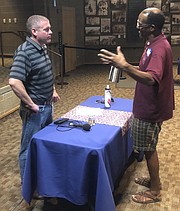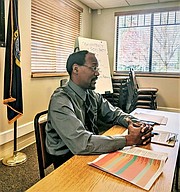This man's goal: Expanding 'shelf-life' of the oppressed
COEUR d'ALENE — At the intersection of two nonprofits stands a tall, lean North Idahoan with one mighty mission.
James McDay, a Coeur d'Alene resident since 2001, started an organization in 2015 called TOC Diversity Resource. TOC (The Other Choice) is dedicated to ethnic diversity inclusion — "providing sensible solutions to address racial inequities in North Idaho," its website says.
McDay was also the driving force behind establishing the first nationally recognized branch of the NAACP (National Association for the Advancement of Colored People) in Idaho in over 85 years. Kootenai County NAACP 14AA was chartered on May 16, 2020. Serving as vice president, McDay makes it a point to welcome people of all ethnic backgrounds to participate.
How McDay got here is one story.
How his hard work is paying off is quite another.
• • •
James McDay was raised in Little Rock, Ark., one of three children to a single mother. If you're a resident of Little Rock, you stand a one in 13 chance of being a victim of a violent or property crime. It's got one of the highest crime rates in the nation, and it did back when McDay, now 53, was a child.
"The gang situation was out of control," McDay said. "The gangs from California were spreading to Arkansas, and my brother got sucked into that lifestyle.”
James was not like his brother, who through gang membership wrought havoc but was also able to protect his little brother.
"I was a bashful kid who was always criticized for being articulate," James said.
Put another way, McDay just didn't fit in. Still, he resisted the lure of gangs, graduated high school and was enrolled at University of Arkansas — Little Rock when two realities collided.
One, his longtime difficulties with math threatened to sink the student who was adept at other subjects.
And two, a conscientious, compassionate teacher altered his life's direction.
• • •
The teacher was a German national who taught at the University of Idaho before joining the faculty at UA-LR. He not only helped James keep his nose above choppy mathematical waters, but he recommended a place where McDay could start all over: a nice little community college on the shores of a beautiful little lake.
"The mistakes I made, no support system, not having housing, not having a means of income — just the hope and dream that I'd come north and find opportunity," McDay said of his motivation to leap from what he knew into what he had never experienced.
"It was sure better than staying in Little Rock," he said. "By the time I came here, my brother was a two-time loser, twice in prison."
McDay arrived in Coeur d'Alene with some books and $14,000 cash for his continuing education, half of which had been scrupulously saved and given by his mother. While math still presented hurdles that were hard for McDay to overcome, he persevered and eventually earned a degree in Human Service Management from the University of Phoenix. But there were struggles along the way.
Without going into specifics, McDay said he ran into conflict with the law — and not necessarily justifiably, either.
"In February 2002, you can look this up in the archives, there was only a handful of us African-Americans on campus — a wrestler, a few basketball players and me," he said. "I dressed like a Black hippy, and that brought attention that I didn't really want."
Instead of wielding his negative experiences as an excuse, McDay tucked them away, seeking not eventual revenge but lasting change.
"When you're in an oppressive situation," he said, "a dream can be powerfully motivating."
• • •
The dream took on tangible form in 2015 with the start of TOC Diversity Resource, which became a registered 501 (c) 3 two years later.
"We wanted to offer educational programs, elementary to high school," McDay said. "It was just about cultural awareness."
But along the way, Black Indigenous People of Color (BIPOC for short) came to McDay in increasing numbers, sharing their worst experiences trying not just to navigate life in an almost all-white demographic, but actually fitting in.
"I found that their experiences were like mine," McDay said. "Those interactions led us to start collecting data in the form of citizen complaint intakes," which then led to McDay forming relationships with the U.S. Department of Justice, American Bar Association, Southern Poverty Law Center and others.
It's not that outrageous acts were perpetrated against them so much as relentless, "subtle micro-aggression" in the workplace, McDay said. It didn't take a doctorate in math for him to realize that "there's a two- to five-year shelf life for BIPOC citizens in Kootenai County."
"It's easier to leave when you're dealing with oppressive scenarios on a daily basis," he said. "But that doesn't help the community as a whole."
As an example, McDay had received Equal Employment Opportunity Commission approval to sue in 2012 as a result of employment discrimination while working for a Panhandle school district. However, he couldn't find a single local lawyer to take the case — "I think as a result of bias due to my outsider status," he said.
The case died, but McDay wasn't dissuaded. In fact, he took it to the next level.
"That's where the NAACP came in," he said.
• • •
McDay has given presentations about the history of the NAACP, and during an interview this week at The Press, it wasn't hard to see his unbridled passion in action. Several times he had to stop himself and start over, a little more calmly.
According to McDay, the NAACP formed in 1909 "with seven white folks and two black folks." Formation was spurred by what he called "the unrestrained murder of Blacks in the South," among other events nationally.
Locally, McDay said, the NAACP chapter is quietly having an impact. Just this week, the organization's national conference wrapped up, with four local voting delegates and four alternates all participating. One ringing message was that members can have an impact in their states.
McDay said there are positive signs locally — improvements in real inclusiveness and mutual respect that preceded and have followed formation of the local chapter, "especially in our city law enforcement." But the goal "to provide the community a real resource to combat hate and racism" is undiminished by the accumulating wins.
"If we really want to change the bad reputation we still have around the nation — sorry, but we do — then we have to get beyond the partisanship and ideology that can kill a community financially," he said.
Toward that end, McDay is hosting the TOC Diversity Resource John Lewis Memorial Event this Saturday. It's a tribute to the man, his advocacy, and how it helped shape our nation, McDay said.
The event will feature a short viewing of “Good Trouble,” followed by an open discussion and interactive workshop — keys to communicating about race. It is open to the public. Due to limited seating, please RSVP to: t.o.cdiversityresource@gmail.com
For more details, see Events on the CDA Press website, cdapress.com.





